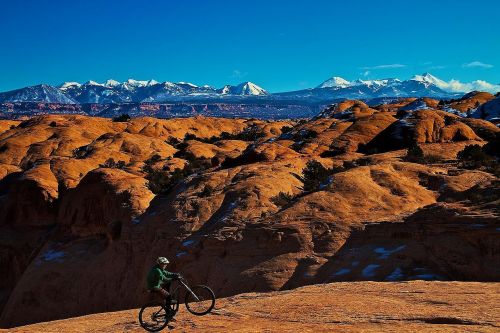MOAB, Utah (BRAIN) — Last week's announcement by the Bureau of Land Management that it will open 200 miles of mountain bike trails in the Moab area to Class 1 e-bikes has industry folks buzzing with both trepidation and eager anticipation.
The new policy takes effect March 1. Depending on who you ask, this BLM regulation change is an impending disaster, a boon to tourism and shop revenues, or as one iconic shop owner told us, “...just not that big of a deal.”
Chile Pepper Bike Shop's Chase Cauthey said he supports the BLM’s new policy. “It’s a great thing for Moab and for our business,” the store's service manager said. “It’s where the industry is going, putting more people on bikes to get out there and enjoy our trails. We were deterring people from coming here because no e-bikes were allowed.”
Chile Pepper has 90 rental bikes now and plans to grow to 110 bikes, with 30 being e-bikes. “We were already gearing up for the change,” Cauthey said. “We didn’t get a heads-up, it was just an educated guess. It's gonna happen, so we might as well get out in front of it.”
Rider education is a big concern at the shop, he said. “We do our best at telling people what they can and can’t do with their ability,” Cauthen said. “Most people are pretty good about listening since their safety is at stake. Some may find out the hard way.”
E-Bike Moab is a rental-only shop. Owner Mick Vallantine told BRAIN he welcomed the BLM announcement. “I certainly hope that business will pick up with the changes. I expect 15 to 20% growth in my business year over year as the word gets out. We have 80 eMTBs to rent now so we won’t need to expand the fleet,” he said.
Current renters are mostly over 40, Vallantine noted. “We recommend trails that will combine their skill set and health issues. We're able to assess the ability of the rider and if they don't have the skills for the trail system, then we advise other options.”
Poison Spider owner Scott Newton shared his positive perspective on the BLM rule change. “I’m glad the BLM took a fact-based approach and didn’t give in to fear-based rhetoric,” he said.
Poison Spider Bicycles has shifted more toward rentals. “Riders from all over the world come to Moab to rent and ride. When they have a great experience, we aim to convert that into a sale. Unfortunately, in many cases, the customer ends up purchasing the same bike from their local bike shop instead,” Newton noted.
Newton described himself as “a complete hater” of e-bikes initially. “That all changed once I rode one,“ he said. “While I've seen lots of illegal e-bike use, in my experience, I’m not seeing trail damage or user conflicts. In fact, I often find e-bikers to be more courteous than some seasoned mountain bikers.”
Concerns about overcrowding are overblown, Newton contended. “Over the last couple of years, tourism in Moab has actually been down. I don’t think we’re about to be overrun with e-bikes. There are just too many incredible new places to ride nearby.”
Ashley Korenblat, owner of tour organizer Western Spirit Cycling, said the decision to open Moab trails to e-bikes was both positive and inevitable, with some limitations. “A motor does not give you skills,” she said. “If you don't have the experience to keep both wheels weighted or know how to time your pedal strokes, an e-bike will not help on a technical trail.”
“E-bikes will allow riders with less fitness to join longer distance tours with more confidence, but it won't allow them to ride technical trails that are outside their skills level. Renting an e-bike for your friend who is a beginner will not make riding gnarly singletrack fun for them.”
The last word from an icon
Troy Rarick, owner of the four-store Over the Edge Sports stores, was instrumental in Fruita, Colorado's trail-building and promotion starting in 1995. “E-bikes were legalized on our (Fruita) trails in 2019 and it really didn’t change anything,” he noted.
Rarick observed that e-bikes were already common on Moab’s trails. “When you see everyone else doing it without enforcement, you do it too. The BLM lost control of the situation and this is their way of getting it back,” Rarick said. “Cracking down on enforcement wouldn't have worked.”
“It’s like when weed got legalized and nothing really changed,” he noted. “It’s a relief that we haven’t seen the knee-jerk fears people predicted. It’s really about people and their attitudes. You can be a jerk on any type of bike.”
IMBA supportive
International Mountain Bicycling Association CEO Kent McNeill said he supports BLM’s decision. “We commend Moab for their responsible effort in making this decision through public process and local input. We support Class 1 access to non-motorized trails,” he said.
Concerns about enforcement are well-founded, McNeill noted. “To make it easier and effective there needs to be clear labeling of eMTBs. Doing so helps avoid the slippery slope of difficult-to-detect technology. Combined with appropriate penalties and clear signage, labeling goes a long way to help provide effective enforcement.”
The BLM’s environmental assessment and an interactive map are available online at the BLM NEPA register.


